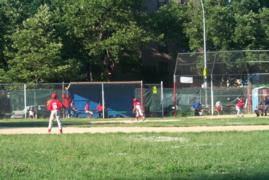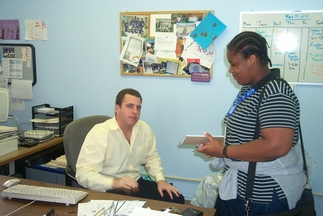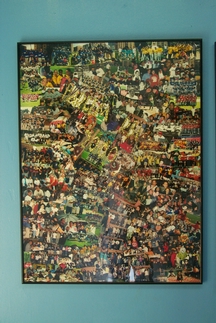|


|
 Afternoons
at Harlem's, Reviving Baseball in Inner Cities, are obviously the
busiest time of the day. Children coming from school rush through
the door and crowd into a small library almost across from it. There
they put their bookbags and jackets down only to walk out the door
again and across the street. What is across the street is the whole
center of Harlem’s RBI, a baseball field (The Field of Dreams) Afternoons
at Harlem's, Reviving Baseball in Inner Cities, are obviously the
busiest time of the day. Children coming from school rush through
the door and crowd into a small library almost across from it. There
they put their bookbags and jackets down only to walk out the door
again and across the street. What is across the street is the whole
center of Harlem’s RBI, a baseball field (The Field of Dreams)
“Across the street there was a lot, it was a garbage lot,”
Natalie Farrar, the Director of Development, explains about their
beginnings. “And we took over that. Now it serves the kids surrounding
the lot.” Harlem's RBI is only one of the 280 RBI centers across
the nation and was the second RBI established. These centers have
the same beginnings with a baseball scout in Los Angeles. There he
decided to start up a center where inner city kids can attend after
school. The idea then started to spread across the country. According
to Richard Berlin, executive director, RBI “ gives a positive
alternative to the street and just hanging out…that is why we
started, by building a baseball field. There are special things about
baseball."
 Over
the years RBI have made many changes and have evolved into the organization
that it is today. When it first started, Harlem's RBI was all about
baseball and only for boys. Now, a decade later, RBI serves [both]
boys and girls by providing after school programs such as homework
help. Making sure that the teens and kids who attend know the importance
of education is one of RBI's goals. Anyone, kid or teen, who attends
receives a mixture of work and play with an hour and a half of homework
help before an hour and a half of baseball. On top of that, there
is a year-round quarterly youth newspaper and other after-school programs,
such as team mentoring and work with the Harbor for Girls and Boys,
another youth program. Over
the years RBI have made many changes and have evolved into the organization
that it is today. When it first started, Harlem's RBI was all about
baseball and only for boys. Now, a decade later, RBI serves [both]
boys and girls by providing after school programs such as homework
help. Making sure that the teens and kids who attend know the importance
of education is one of RBI's goals. Anyone, kid or teen, who attends
receives a mixture of work and play with an hour and a half of homework
help before an hour and a half of baseball. On top of that, there
is a year-round quarterly youth newspaper and other after-school programs,
such as team mentoring and work with the Harbor for Girls and Boys,
another youth program.
RBI offers free programs year round. The softball and baseball teams
that RBI runs travel every year to an event that allows the team to
play with the other RBI teams across the country. The team almost
serves as a connection between the 120 cities, which have set up RBIs
to work with inner city kids and teens. RBI provides all team clothing
and equipment. With incidents of unruly parents in the bleachers and
sports in general being taken too seriously, Harlem's RBI also provides
a code of ethics, overall respect for each other.
 RBI's
success depends solely on the community. Since it is a non profit
organization it depends on volunteers to help them with the team and
after-school programs. The amount of people who volunteer their time
is a direct appreciation from the community and shows how important
RBI has become to East Harlem over the years. There are about 4 or
5 coaches for each of the three teams they run, the Grays and the
junior Mets and Yankees. "The players learn how to cooperate
in a team with their peers, work with adults," Farrar states
about the connection that RBI brings. "They learn how to have
respect for each other and value everyone. They belong to one group
that a common goal." RBI's
success depends solely on the community. Since it is a non profit
organization it depends on volunteers to help them with the team and
after-school programs. The amount of people who volunteer their time
is a direct appreciation from the community and shows how important
RBI has become to East Harlem over the years. There are about 4 or
5 coaches for each of the three teams they run, the Grays and the
junior Mets and Yankees. "The players learn how to cooperate
in a team with their peers, work with adults," Farrar states
about the connection that RBI brings. "They learn how to have
respect for each other and value everyone. They belong to one group
that a common goal."
RBI has proven itself to be a very strong factor in the community.
Hundreds of teens and kids attend RBI's programs after school. The
numbers of success stories from alumni are numerous and continue to
grow. The plans and goals they had when they first turned a garbage
lot into their own Field of Dreams have worked and continue to evolve.
However the formula they have continue to use has been very basic,
as Farrar explains it is simply to provide a place where kids can
belong to. "We give the children a place to be, to have fun."
|